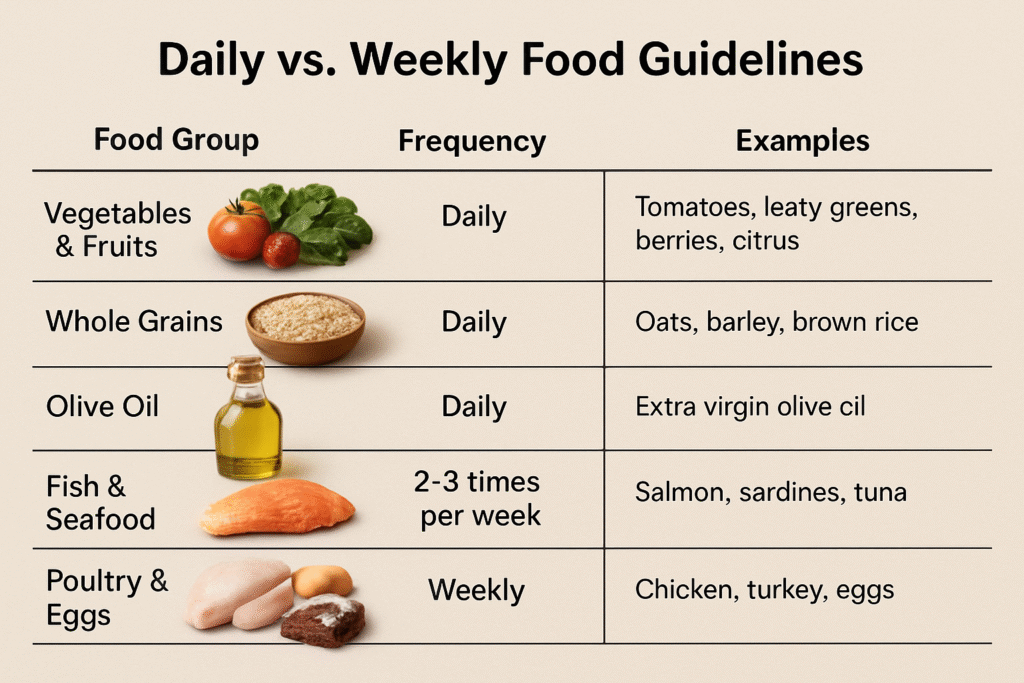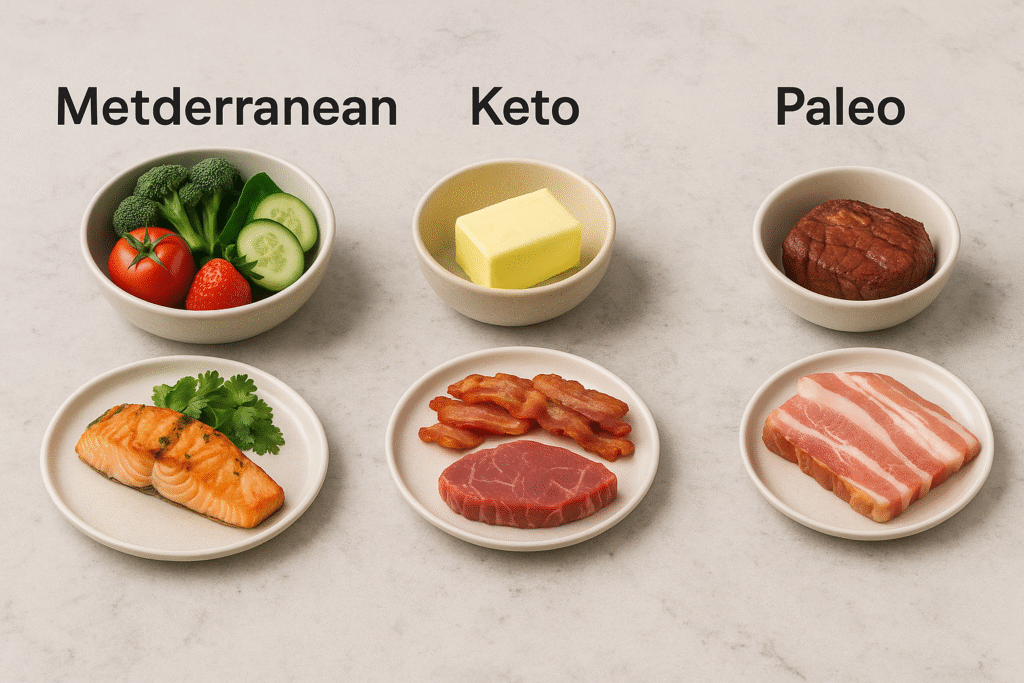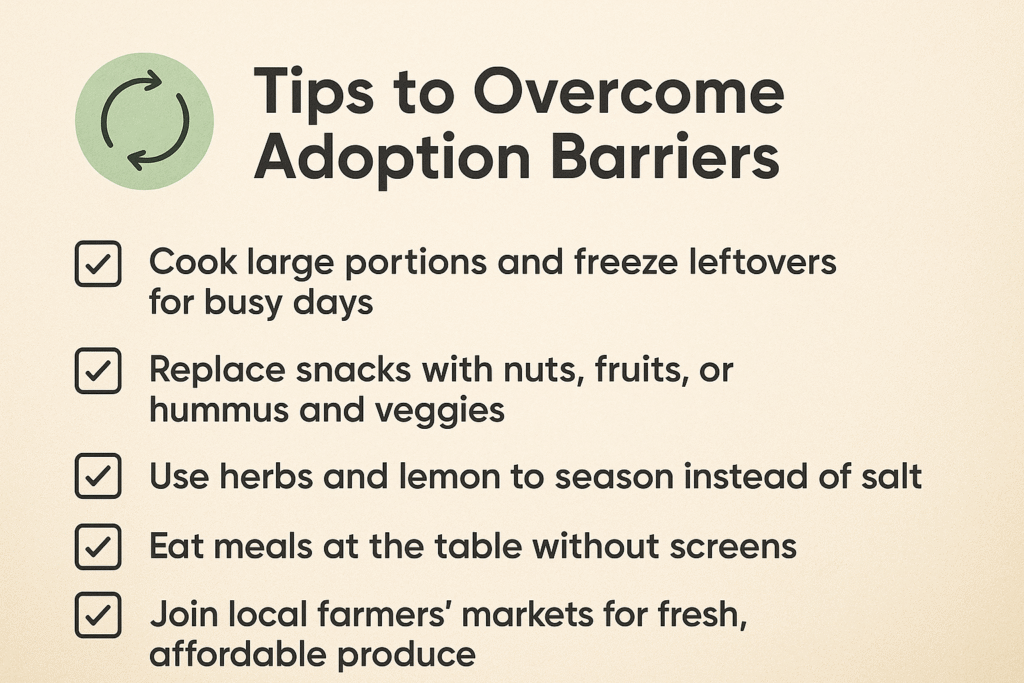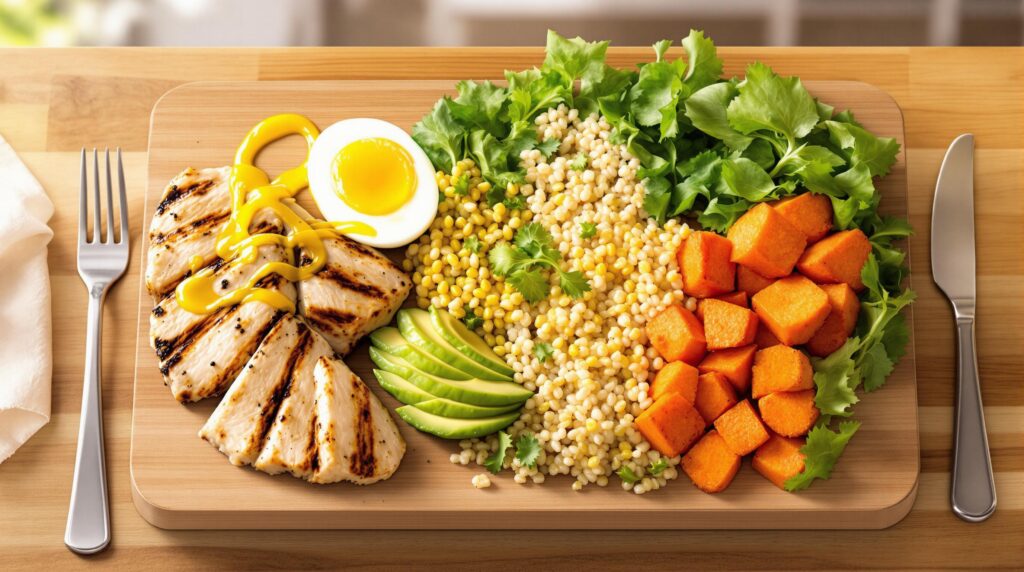The Mediterranean diet isn’t just a trend—it’s a time-tested way of eating that’s been linked to lower rates of heart disease, improved longevity, and enhanced overall well-being. Inspired by the traditional eating habits of countries bordering the Mediterranean Sea, this diet emphasizes whole, nutrient-rich foods like fruits, vegetables, olive oil, fish, and legumes.
With heart disease still the leading cause of death in the U.S., many Americans are turning to the Mediterranean diet as a natural, sustainable solution. In this article, we’ll break down what makes this eating plan so powerful, how it supports heart health, and how you can start incorporating it into your daily life.
What Is the Mediterranean Diet?

A Cultural and Historical Overview
The Mediterranean diet reflects the traditional eating patterns of countries like Greece, Italy, and Spain. Rather than a rigid meal plan, it’s a flexible and lifestyle-oriented approach to food rooted in culture, community, and balance. Meals are often shared with others, emphasizing moderation, variety, and enjoyment.
Core Principles and Food Groups
At its foundation, the Mediterranean diet focuses on:
- Whole, plant-based foods like fruits, vegetables, nuts, seeds, and legumes
- Healthy fats, particularly olive oil
- Lean proteins, especially fish and seafood
- Whole grains such as barley, bulgur, and brown rice
- Moderate dairy (cheese and yogurt)
- Red wine in moderation (optional)
According to the Harvard School of Public Health, the Mediterranean diet ranks among the healthiest dietary patterns globally due to its emphasis on whole foods, unsaturated fats, and balanced nutrition.
🥗 H4: Daily vs. Weekly Food Guidelines
| Food Group | Frequency | Examples |
|---|---|---|
| Vegetables & Fruits | Daily | Tomatoes, leafy greens, berries, citrus |
| Whole Grains | Daily | Oats, barley, brown rice |
| Olive Oil | Daily | Extra virgin olive oil |
| Fish & Seafood | 2–3 times per week | Salmon, sardines, tuna |
| Poultry & Eggs | Weekly | Chicken, turkey, eggs |
| Dairy | Weekly | Yogurt, cheese |
| Red Meat & Sweets | Occasionally | Beef, lamb, pastries |
Health Benefits of the Mediterranean Diet

Cardiovascular Protection
Numerous studies have linked the Mediterranean diet to a significantly reduced risk of heart disease. Rich in antioxidants, omega-3 fatty acids, and fiber, this diet helps lower LDL (bad) cholesterol and supports healthy blood pressure levels.
Research published by the National Institutes of Health (NIH) supports the diet’s effectiveness in reducing cardiovascular disease risk through improved lipid profiles and reduced inflammation.
💡 Quick Tip: Swap out butter and margarine for olive oil in your cooking to boost heart health without sacrificing flavor.
Weight Management and Metabolic Health
While not a weight-loss diet per se, the Mediterranean eating pattern supports natural weight control. The focus on whole foods and healthy fats promotes satiety, reducing the likelihood of overeating and sugar crashes. It also improves insulin sensitivity, lowering the risk of type 2 diabetes.
Brain and Cognitive Function
The diet’s abundance of polyphenols and healthy fats may help protect against cognitive decline. Some research suggests a reduced risk of Alzheimer’s and slower age-related memory loss among long-term adherents of the diet.
🧠 H4: Nutrients Linked to Brain Health
| Nutrient | Source Foods | Cognitive Benefit |
|---|---|---|
| Omega-3s | Fatty fish, walnuts | Supports memory and brain cell function |
| Polyphenols | Olive oil, red wine, berries | Fights oxidative stress in the brain |
| B vitamins | Leafy greens, legumes | Essential for nerve health and energy |
| Vitamin E | Nuts, seeds, olive oil | Protects neurons from damage |
How the Mediterranean Diet Compares to Other Popular Diets

vs. Keto Diet
The ketogenic diet focuses on extremely low carbohydrate intake and high fat consumption. While it can lead to quick weight loss, it often eliminates entire food groups, such as fruits and whole grains, which are abundant in the Mediterranean diet. In contrast, the Mediterranean approach promotes long-term health through balanced, inclusive nutrition.
vs. Paleo Diet
The Paleo diet cuts out dairy, legumes, and grains entirely, aiming to mimic the diet of prehistoric humans. Although it emphasizes whole foods, it lacks the flexibility and scientific backing of the Mediterranean diet. The latter includes fermented dairy and legumes, which are proven to support gut and heart health.
vs. DASH Diet
The DASH (Dietary Approaches to Stop Hypertension) diet is also heart-healthy, emphasizing low-sodium and nutrient-rich foods. However, the Mediterranean diet is more sustainable and enjoyable for many due to its focus on flavorful fats and cultural practices like shared meals and moderate wine consumption.
📌 H4: Diet Comparison Overview
| Diet Type | Flexibility | Includes Whole Grains? | Includes Dairy? | Heart-Healthy? | Cultural Elements |
|---|---|---|---|---|---|
| Mediterranean | High | Yes | Yes | Yes | Strong |
| Keto | Low | No | Limited | Debated | None |
| Paleo | Moderate | No | No | Limited | None |
| DASH | Moderate | Yes | Low-fat only | Yes | Limited |
Practical Tips to Start the Mediterranean Diet

Stocking Your Kitchen
Transitioning to the Mediterranean diet begins with your grocery list. Stock your pantry with extra virgin olive oil, canned beans, whole grains like quinoa and farro, and a variety of herbs and spices. Fill your fridge with seasonal vegetables, leafy greens, fresh fruits, fish, and yogurt.
✅ Expert Summary: A Mediterranean-friendly kitchen is colorful, simple, and centered around fresh, unprocessed ingredients.
Cooking the Mediterranean Way
Mediterranean cooking is all about simplicity and flavor. Use olive oil as your base for sautéing, grilling, or drizzling over vegetables. Incorporate herbs like oregano, rosemary, and basil to elevate taste without added salt. Opt for steaming, baking, and roasting rather than frying.
Meal Planning and Prep
To make this lifestyle sustainable, plan weekly meals ahead of time. Batch-cook grains and legumes, prepare salad dressings using olive oil and lemon, and keep containers of cut veggies and pre-washed greens ready to go. Include fish in your menu at least twice per week.
🍽️ H4: One-Day Mediterranean Meal Plan
| Meal | Menu Example |
|---|---|
| Breakfast | Greek yogurt with honey, walnuts, and berries |
| Lunch | Quinoa salad with chickpeas, cucumber, tomatoes |
| Snack | Handful of almonds and a fresh orange |
| Dinner | Grilled salmon with roasted vegetables and barley |
Common Misconceptions and Challenges
“It’s Too Expensive”
A common myth is that eating Mediterranean is costly. While fresh seafood and olive oil can be pricey, staples like legumes, seasonal produce, whole grains, and canned fish are budget-friendly. Buying in bulk and cooking at home can significantly reduce costs.
“It’s Just About Olive Oil and Wine”
Although olive oil and red wine are iconic in Mediterranean cuisine, the diet is far more complex. It’s a synergistic pattern that includes daily physical activity, communal meals, mindful eating, and a variety of nutrient-dense foods.
📌 Did You Know? The Mediterranean diet is recognized by UNESCO as an intangible cultural heritage of humanity, emphasizing its deep cultural roots.
Adapting to the American Lifestyle
Busy schedules, processed food availability, and social habits can make it hard to follow a Mediterranean diet in the U.S. However, meal prepping, smart shopping, and slow eating practices can bridge the gap between tradition and modern life.
🔄 H4: Tips to Overcome Adoption Barriers
- Cook large portions and freeze leftovers for busy days
- Replace snacks with nuts, fruits, or hummus and veggies
- Use herbs and lemon to season instead of salt
- Eat meals at the table without screens
- Join local farmers’ markets for fresh, affordable produce
Conclusion
The Mediterranean diet is more than just a way of eating—it’s a lifestyle grounded in culture, balance, and proven health benefits. From protecting your heart and brain to enhancing your overall well-being, it offers a sustainable and enjoyable path toward long-term health. With simple ingredients, mindful habits, and flexible meals, anyone can start reaping the rewards of this time-tested approach to nutrition.
Main Takeaways
- The Mediterranean diet emphasizes whole foods, healthy fats, and lean proteins
- Proven to support cardiovascular, metabolic, and cognitive health
- Flexible and culturally rich, making it enjoyable and sustainable
- Focuses on quality ingredients and mindful eating
- Adaptable for all lifestyles and budgets with the right planning




Pingback: The Ultimate Mediterranean Diet Grocery List for Heart Health
Pingback: Start a Healthy Lifestyle Today: What Everyone Missed in the Latest Study
Pingback: Mediterranean Diet Explained: How to Start, What to Eat, and Why It Works
Pingback: Mediterranean Diet Foods List for Heart Health: What to Eat to Lower Cholesterol Naturally
Pingback: Mediterranean Diet Foods List: 30 Staples You Can Find at Any Grocery Store
Pingback: MIND Diet for Brain Health: 10 Must-Have Foods